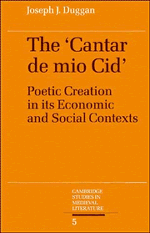Book contents
- Frontmatter
- Dedication
- Contents
- Acknowledgments
- Modern equivalents to names in the maps
- Maps
- 1 Historical and theoretical framework
- 2 The acquisition of wealth
- 3 Economy and gift-giving
- 4 Social status, legitimacy, and inherited worth
- 5 The poet's milieu
- 6 Geography and history
- 7 The Cantar de mio Cid and the French epic tradition
- 8 Mode of composition
- 9 Conclusion
- Notes
- List of references
- Index
4 - Social status, legitimacy, and inherited worth
Published online by Cambridge University Press: 05 August 2014
- Frontmatter
- Dedication
- Contents
- Acknowledgments
- Modern equivalents to names in the maps
- Maps
- 1 Historical and theoretical framework
- 2 The acquisition of wealth
- 3 Economy and gift-giving
- 4 Social status, legitimacy, and inherited worth
- 5 The poet's milieu
- 6 Geography and history
- 7 The Cantar de mio Cid and the French epic tradition
- 8 Mode of composition
- 9 Conclusion
- Notes
- List of references
- Index
Summary
The relationship between the Cid and the Infantes de Carrión in the poem, totally fictitious from the vantage point of history (Spitzer 1948, Horrent 1973, Chalon 1976, Smith 1980, Lacarra 1980a), may have been conceived in part, as Lacarra has argued cogently (1980a: 137–56), to depict as reprehensible the Beni-Gómez, García Ordóñez, and Alvar Díaz – ancestors of the Castro family, one of the most powerful in the political life of late twelfth- and early thirteenth-century Castile and Leon. Lacarra believes that the force behind this portrayal is the clan that was the Castros' most intense rival, the Laras, one of whose members, the royal tutor Manrique de Lara, was killed by Fernando de Castro in 1164 at the battle of Huete. But the clash between the family of Carrión and the Cid also serves another function in the poem: to provide a context within which a question can be raised and answered concerning the nature of the Cid's descent from Diego Laínez and, concomitantly, his progeny's worthiness to contract marriages with partners of the very highest social rank. This last development may well be motivated by the fact that, as Lacarra has stressed, both the Laras of Molina and Alfonso VIII himself were related to Rodrigo Díaz of Vivar.
The Cid's third judicial demand opens the criminal part of the legal proceedings, occasioning a full-scale controversy about personal status, a subject that the Infantes had raised before.
- Type
- Chapter
- Information
- The Cantar de mio CidPoetic Creation in its Economic and Social Contexts, pp. 43 - 57Publisher: Cambridge University PressPrint publication year: 1989



